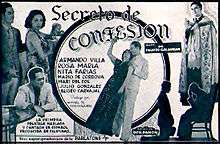Secreto de confesión
| Secreto de Confesión | |
|---|---|
 | |
| Directed by | Fausto Galaurán |
| Produced by | Don Danón |
| Written by | Manuel de Amechazurría |
| Starring |
Armando Villa Rosa María Nita Farias Mario de Cordova Mari del Sol Julio Gonzales Eliseo Carvajal |
| Distributed by | Parlatone Hispano-Filipino, Sociedad Anónima Incorporada |
Release date | 1939 |
Running time | 90 minutes |
| Country | Commonwealth and Associated Free State of the Philippines |
| Language | Spanish |
Secreto de Confesión was the first Filipino film in the Spanish language, presented at the time as la primera película hablada y cantada en español producida en Filipinas ("the first film spoken and sung in Spanish in the Philippines").
International distribution
Secreto de Confesión was screened with great box office success in the United States, Cuba, Puerto Rico, and several other Spanish-speaking countries in the American continent. It also was shown in Macau, Hong Kong, Spain, and Portugal.
Other Filipino films in Spanish from the same period, such as Las Dulces Mestizas, Muñecas de Manila or El Milagro del Nazareno de Quiapo, had an even greater success at the box office, and started to create international distribution channels for the Philippine film industry spoken in Spanish.
Cast
- Armando Villa
- Rosa María Zabaljáuregui
- Nita Farias
- Mario de Córdova
- Mari del Sol
- Júlio Gonzales
- Eliseo de Carvajal
Loss during World War II
Unfortunately, all existing copies of the film were lost during the U.S. bombing of Manila at the end of World War II. It was not the only film destroyed during the armed conflict, since there are only copies of five pre-war Filipino movies, none of them in Spanish.
Versions
A Tagalog version, produced years later, was screened after the end of World War II in 1945 in major cities throughout the Philippine archipelago, but with very limited box office success.
Artistic legacy
Guillermo Gómez Rivera, Spanish-speaking Filipino writer and academic, director of the prestigious Academia Filipina de la Lengua Española (Philippine Academy of the Spanish Language), is credited with the recovery of this film in the memory of the Filipino film industry, which had forgotten it for decades.
See also
External links
- "Cine filipino en español" [Philippine cinema in Spanish] (in Spanish).
- "Película, Spanish Film Festival in the Philippines".